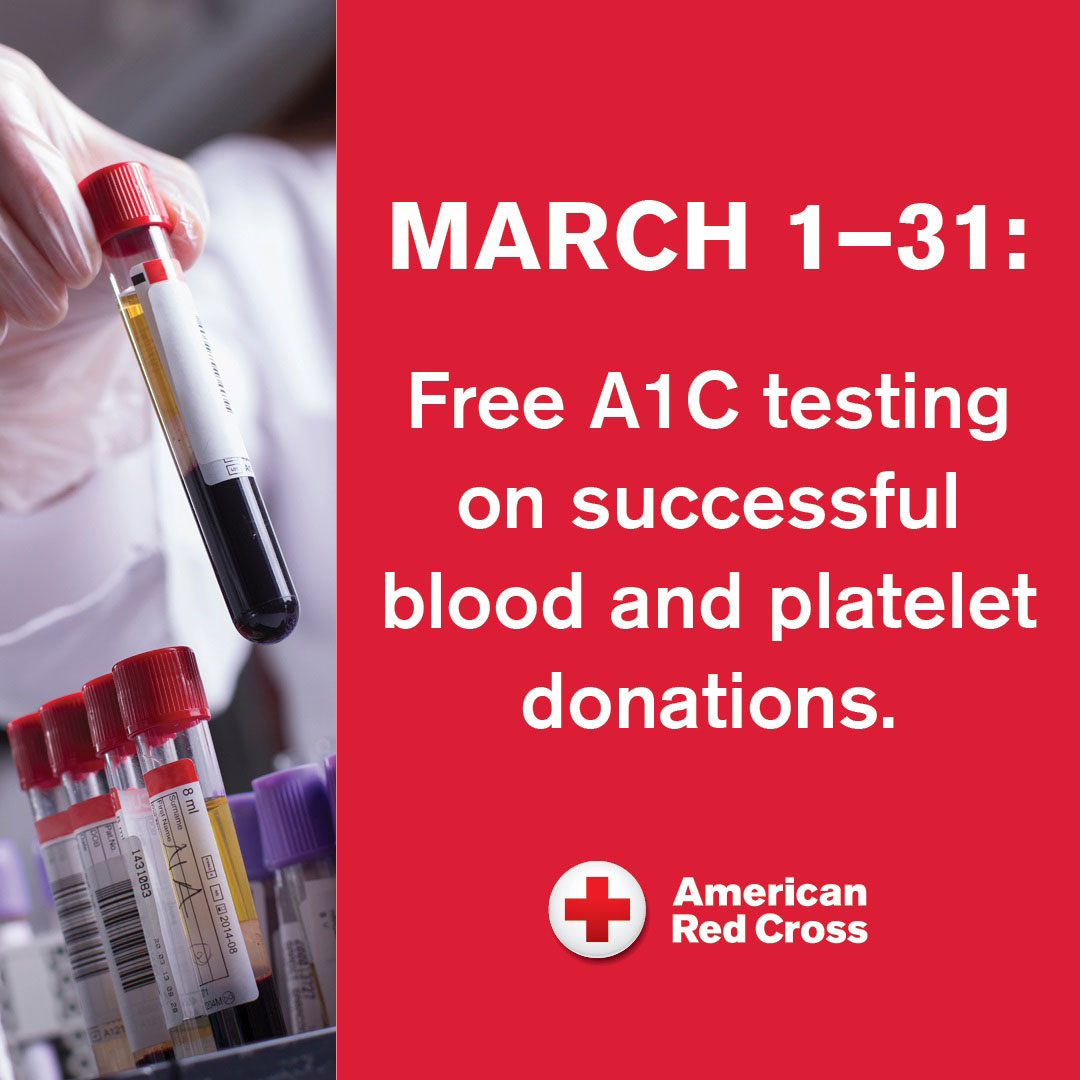
FEBRUARY 25, 2025 — The Northwest Region of the American Red Cross is helping to bridge access to health care for blood donors by providing free A1C testing, commonly used to screen for diabetes and prediabetes, on all successful blood, platelet and plasma donations in March.
One-third of people lack access to regular primary care in the U.S., where diabetes affects 1 in 10 people and nearly a quarter of those living with it have been undiagnosed, according to the Centers for Disease Control and Prevention (CDC). The free A1C screening aims to help address this gap by empowering blood donors with valuable information to maintain their health and well-being. This new offering is among the longtime work of the Red Cross to support the health of communities, which also includes disaster relief efforts such as basic disaster health and mental health services among other assistance.
Visit RedCrossBlood.org, use the Red Cross Blood Donor App or call 1-800-RED CROSS to book a time to give in March and learn more about your health. Additionally, all who come to give blood, platelets or plasma March 1-31 will receive a $10 Amazon.com Gift Card by email. See RedCrossBlood.org/March for details on both offers.
You can also make a financial donation at redcross.org/GivingDay on March 26 to support people with disaster services such as emergency shelter, food, relief supplies, basic health care, emotional support and financial assistance. Both efforts are part of Red Cross Month activities in March.
The Red Cross is also helping to support the health of communities by installing free smoke alarms and sharing home fire safety information with families in at-risk communities through its Sound the Alarm events. No experience necessary; training will be provided. Register and learn more about volunteer opportunities happening in March and April throughout the Northwest Region at redcross.org/nwhomefire.
BRIDGING HEALTH CARE ACCESS THROUGH A1C SCREENING According to the CDC, some 90% of people living with diabetes in the U.S. have Type 2, a largely preventable and often reversible insulin-resistant condition that can cause dangerously high blood sugar levels. Left untreated, Type 2 diabetes can lead to serious health complications, such as kidney failure, stroke and heart issues.
“Type 2 diabetes develops over years and may not cause obvious symptoms until serious damage has been done,” said Dr. Courtney Lawrence, medical director for the Red Cross. “By understanding our own health, we can create a foundation to help prevent chronic illness, improve the quality of day-to-day living and save lives. Blood donation can now be part of that journey.”
The Red Cross will begin the month-long A1C screening for successful donations starting on March 1. Donors can expect to receive the results of their test within one to two weeks through the Red Cross Blood Donor App or online donor portal, and they are encouraged to consult their health care provider if their A1C level is elevated. A1C is the latest health insight that the Red Cross provides to blood, platelet and plasma donors, who can already access ongoing donation information such as pulse, blood pressure, body temperature and hemoglobin levels.
DELIVERING CARE AMID INTENSIFYING DISASTERS As part of disaster relief efforts, disaster health and mental health services are as important as ever in the face of intensifying extreme weather across the country. The Red Cross is responding to nearly twice as many major disasters than it did a decade ago across the country — on top of everyday crises like home fires in Washington state and Northern Idaho. After disasters of all sizes, the Red Cross provides emergency lodging, food and financial assistance.
Red Cross health and mental health support may include replacing lost prescription medications and medical equipment, helping people in its shelters cope with chronic illnesses aggravated by the disaster, and providing emotional support and referrals to community health and mental health professionals for additional care.
It’s thanks to volunteers like Tory Fiedler, from Selah, Washington, that this care is possible. Tory spent weeks in California after recent wildfires to help coordinate mental health support for community members following the Palisades and Eaton fires.
“This is my service to my community and to my country,” said Fiedler. “This is what I do because I’m a humanitarian. When we take care of others, we take care of ourselves. There’s no other work I’d rather be doing.”
The record-breaking wildfires in California came on the heels of 2024 having the second-highest number of billion-dollar disasters in a single year, due to major events like hurricanes, floods and tornadoes, according to the National Oceanic and Atmospheric Administration.
About the American Red Cross:
The American Red Cross shelters, feeds and provides comfort to victims of disasters; supplies about 40% of the nation’s blood; teaches skills that save lives; distributes international humanitarian aid; and supports veterans, military members and their families. The Red Cross is a nonprofit organization that depends on volunteers and the generosity of the American public to deliver its mission. For more information, please visit redcross.org or CruzRojaAmericana.org, or follow us on social media.
Support all the urgent humanitarian needs of the American Red Cross.
Find a drive and schedule a blood donation appointment today.
Your time and talent can make a real difference in people’s lives. Discover the role that's right for you and join us today!